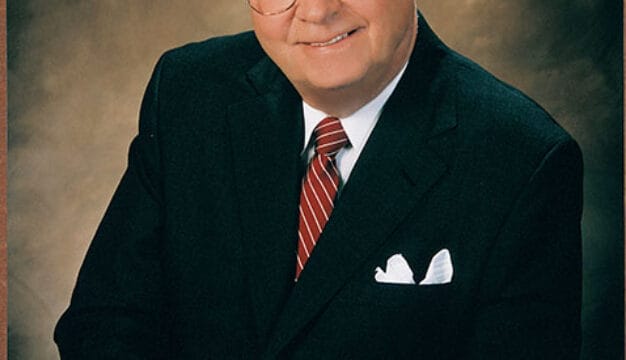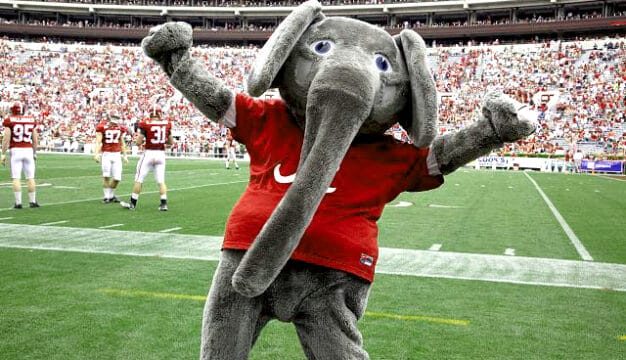Rowdy Gaines
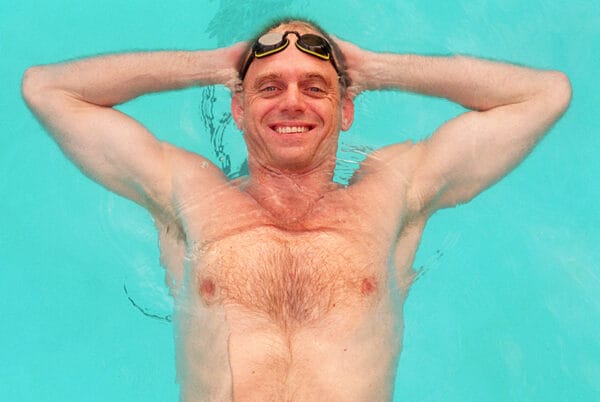 Rowdy Gaines
Rowdy Gaines (1959- ) gained international fame while a student at Auburn University as one of the fastest swimmers in the world. Although not able to compete in the 1980 Olympics in Moscow because of a United States-led boycott of the games, he set world records in competitions that year and was named “World Swimmer of 1980.” He earned three gold medals at the 1984 Olympics in Los Angeles and also won nine national and two Pan-American titles. He would later set many more world records as master swimmer in competitions for the 30-34 and 50-54 age groups. His prominence in the sport has continued as an analyst for NBC’s televised coverage of all swimming and open-water events for each Olympics since 1996.
Rowdy Gaines
Rowdy Gaines (1959- ) gained international fame while a student at Auburn University as one of the fastest swimmers in the world. Although not able to compete in the 1980 Olympics in Moscow because of a United States-led boycott of the games, he set world records in competitions that year and was named “World Swimmer of 1980.” He earned three gold medals at the 1984 Olympics in Los Angeles and also won nine national and two Pan-American titles. He would later set many more world records as master swimmer in competitions for the 30-34 and 50-54 age groups. His prominence in the sport has continued as an analyst for NBC’s televised coverage of all swimming and open-water events for each Olympics since 1996.
Ambrose Gaines IV was born on February 17, 1959, the son of Ambrose III, who owned a gas station, and Jettie Ann Coltharp Gaines, in Winter Haven, Florida. His nickname, “Rowdy,” was given to him by his father and stemmed from the 1950s television series “Rawhide,” in which actor Clint Eastwood played the character “Rowdy.” Not adept at other sports, Gaines discovered he could swim faster than his friends when playing underwater tag, but it was not until his junior year in high school that he started swimming competitively. As a senior, he won the state championship in the 200-yard freestyle and finished second in the 100-yard freestyle, but Auburn University was the only school that recruited him. Under Richard Quick’s coaching at Auburn, Rowdy’s swimming times improved so quickly that he was soon representing the United States in international competition. At the 1978 Swimming World Championships in Berlin, West Germany, he finished second in the 200-meter freestyle over two highly favored Soviet swimmers and joined his teammates in winning gold medals in the 4×100 and 4×200 freestyle. At the Pan American Games in San Juan, Puerto Rico, in 1979, he was a gold medalist in those three events as well. At the 1980 United States Swimming National Championships in Austin, Texas, Gaines broke world records in the 100-meter and 200-meter freestyle, with respective times of 00.49.36 and 1.49.16, and he was favored to sweep all the sprinting events in the pool at the upcoming Olympics in Moscow that summer. Named “World Swimmer of 1980” by Swimming World, his elite status was further recognized when he was named Southeastern Conference Athlete of the Year over college football star Herschel Walker, whose Georgia Bulldogs had won the 1980-81 National Championship.
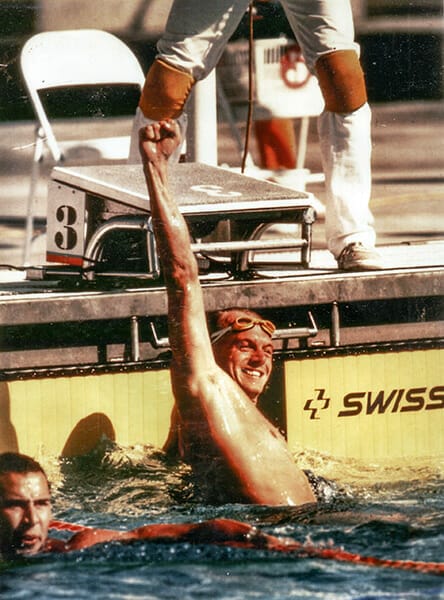 Rowdy Gaines Sets World Record
Now at the peak of his swimming ability, Gaines’s hopes to win his sport’s greatest prize were dashed by the U.S. boycott of the 1980 Olympics because of rising political tensions between the United States and the Soviet Union. Discouraged, he retired for six months and, after graduating from Auburn in 1982, came back to capture two individual silver medals and three relay gold medals at the 1982 Swimming World Championships in Guayaquil, Ecuador. Despite his wins, he found himself losing the confidence needed to sustain him to the next Olympic Games in 1984 in Los Angeles, California. The 1983 Pan American Games in Caracas, Venezuela, would mark the lowest point of his career, having had his confidence shaken and having watched his record in the 200-meter broken. Soon after, Gaines discovered a new interest that drew him out of his despondent state. He began lifting weights with an Auburn University biomechanical engineer who had devised a new weight-training system stressing negative resistance. He also was inspired by “World’s Strongest Man” Bill Kazmaier, who was working out in the same weight room using the same system. Gaines became stronger in the water but, past his prime at age 25, barely made the 1984 U.S. Olympic team. Gaines far exceeded expectations, however, and set a winning Olympic record in the 100-meter freestyle and anchored relay teams that established world records in the 4×100 freestyle and the 4×100 medley.
Rowdy Gaines Sets World Record
Now at the peak of his swimming ability, Gaines’s hopes to win his sport’s greatest prize were dashed by the U.S. boycott of the 1980 Olympics because of rising political tensions between the United States and the Soviet Union. Discouraged, he retired for six months and, after graduating from Auburn in 1982, came back to capture two individual silver medals and three relay gold medals at the 1982 Swimming World Championships in Guayaquil, Ecuador. Despite his wins, he found himself losing the confidence needed to sustain him to the next Olympic Games in 1984 in Los Angeles, California. The 1983 Pan American Games in Caracas, Venezuela, would mark the lowest point of his career, having had his confidence shaken and having watched his record in the 200-meter broken. Soon after, Gaines discovered a new interest that drew him out of his despondent state. He began lifting weights with an Auburn University biomechanical engineer who had devised a new weight-training system stressing negative resistance. He also was inspired by “World’s Strongest Man” Bill Kazmaier, who was working out in the same weight room using the same system. Gaines became stronger in the water but, past his prime at age 25, barely made the 1984 U.S. Olympic team. Gaines far exceeded expectations, however, and set a winning Olympic record in the 100-meter freestyle and anchored relay teams that established world records in the 4×100 freestyle and the 4×100 medley.
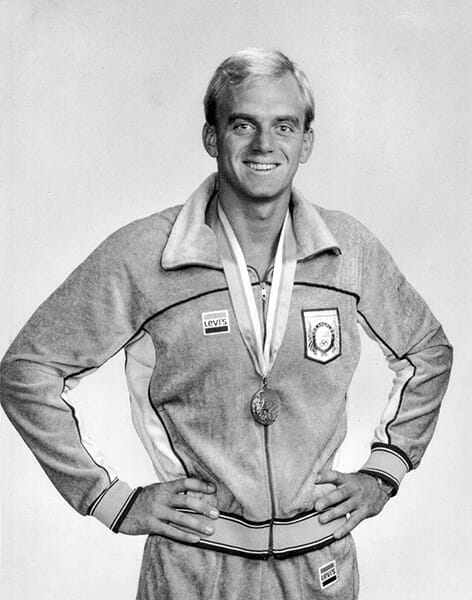 Rowdy Gaines with Medals
He was able to become the fastest human in the water during the early 1980s through a combination of natural ability, long hours spent training in the pool and weight room, a love of the sport, and the support of his teammates. Coach Richard Quick noted the advantage Gaines enjoyed because of his large hands and feet. During this period, swimming did not garner significant media attention, but Gaines’s record-breaking performances helped to popularize the sport and enable subsequent champions to make a living from it. His multiple NCAA championships and international renown also set the stage for Auburn University to become a powerhouse in swimming and to bring favorable attention to Alabama. In 1989, he married Judith Lynn Zachea, with whom he would have four daughters.
Rowdy Gaines with Medals
He was able to become the fastest human in the water during the early 1980s through a combination of natural ability, long hours spent training in the pool and weight room, a love of the sport, and the support of his teammates. Coach Richard Quick noted the advantage Gaines enjoyed because of his large hands and feet. During this period, swimming did not garner significant media attention, but Gaines’s record-breaking performances helped to popularize the sport and enable subsequent champions to make a living from it. His multiple NCAA championships and international renown also set the stage for Auburn University to become a powerhouse in swimming and to bring favorable attention to Alabama. In 1989, he married Judith Lynn Zachea, with whom he would have four daughters.
Rowdy’s greatest personal challenge, however, came in 1991, while he was managing the Oahu Club, a tennis and swimming facility in Honolulu, Hawaii. He contracted Guillain–Barré Syndrome, a rare neurological condition that attacks the nervous system and results in almost total paralysis. He went from being an Olympic champion to an invalid who could hardly perform even simple everyday tasks. The treatment, called plasmapheresis, involved cycling his blood through a cleansing machine and then back into his body. The sessions were extremely painful and had to be done daily for three months. Gaines spent six weeks in the hospital and six more as an outpatient and lost 40 pounds. Within six months, however, he had recuperated sufficiently to start swimming competitively again, and in 1996, at age 35, qualified to enter trials for the upcoming Olympics in Atlanta, Georgia.
Ultimately, Gaines chose not to pursue a spot on the U.S. Olympic team, instead accepting an offer to work in a marketing and public relations position at Auburn University and to serve as an NBC Olympics commentator. In addition to NBC, Gaines provided commentary on swimming for CBS, TNT, ESPN, and TBS, and thereby reentered the public eye. His presence poolside at every Olympic Games since Atlanta and at other major competitions enabled viewers to gain a greater appreciation of the sport, and his accomplishments as a swimmer lent special credence to his commentary.
An Olympic swimming legend in the vein of Buster Crabbe, Mark Spitz, and Michael Phelps, Gaines has received many accolades, resulting in his induction into the Alabama Sports Hall of Fame, the United States Olympic Hall of Fame, and the International Swimming Hall of Fame.
Since 2007 he has served as a spokesman for LIMU, a company in Lake Mary, Florida, that markets dietary supplements to promote health and energy. Under LIMU’s charitable arm, called Rowdy Kidz, Gaines travels throughout the country providing free swim clinics for local children and offering a message of the importance of discipline, dedication, and teamwork. He also volunteers his time for the United Cerebral Palsy Foundation and Swim Across America, a program that raises money for cancer research. He resides in Lake Mary.
Additional Resources
“Ambrose ‘Rowdy’ Gaines.” File, Special Collections and Archives, Auburn University, Auburn, Alabama.
Archbold, Hunt. “Olympics Promise to be Rowdy.” Montgomery Advertiser, June 23, 1996.
“AU’s Gaines Swims into Olympic Commentary.” Birmingham News, July 22, 1996.
Bisher, Furman. “Rowdy Gaines: Auburn’s Golden Hope.” Sky (August 1982): 74-76.
Gosman, Mike. “Rowdy Gaines.” In Swimming: Character and Excellence, pp. 97-109. Silver Spring, Md.: Arche Inc., 1998.
“Rowdy Gaines,” People 46(3), July 15, 1996, 80-81.
Zenor, John. “Ex-Olympian Gaines Travels Road Back to Good Health.” Montgomery Advertiser, May 3, 1997.
